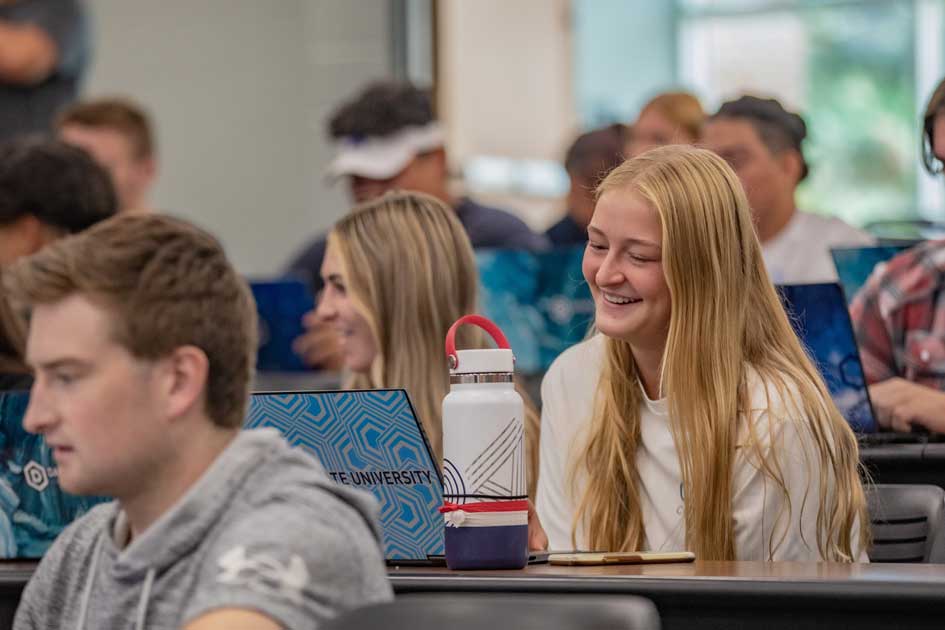Non-Traditional and Prior Learning Credit
Dakota State University allows undergraduate degree-seeking students to earn academic credit for non-traditional learning experiences when those experiences are equivalent to coursework provided at DSU.
What is non-traditional credit?

Have you served in the United States Armed Forces? Have you taken an AP course or CLEP exam? Your life experience or accomplishments could transfer to college credit.
Dakota State University awards advanced standing credit through several programs. In consultation with faculty advisors, all credits accepted are applied toward the completion of major or elective requirements.
Explore how your credit from standardized exams, industry certifications, and military service may fulfill course credit at DSU.
View the Prior Learning Dashboard
Non-traditional credit includes:
-
Credit by Exam
-
Advanced Placement (AP)
-
College Level Examination Program (CLEP)
-
DANTES Subject Standardized Test
-
Military Credit (DSST)
-
Prior Learning experience
-
Professional/industry Certifications
-
International Baccalaureate.
Baccalaureate-degree students may earn a maximum of 30 semester hours, and associate-degree students may earn a maximum of 15 semester hours via non-traditional learning experiences.
Additional information regarding non-traditional learning experiences can be found within DSU's University Policies.
Types of non-traditional credit
Credit for work accomplished in high school through the Advanced Placement program of the College Examination Board will be awarded, based on the approved exams and scores noted in the university catalog under "Advanced Placement". South Dakota public university system will only accept Advanced Placement scores recorded within five years from the time a student seeks credit by examination.
- Students complete the Advanced Placement test administered by their high schools and request that the scores be reported to Dakota State University.
- Advance Placement sends scores report to the students and to DSU's Provost/Academic Vice President Office. The Provost/Academic Vice President's Office notifies the student and Registrar of the exam results. The Registrar enters the credit for the examinations on the students' transcripts. Nothing is entered on transcripts if the AP score does not meet DSU credit standards.
Students may take CLEP (College Level Examination Program) exams to earn credit for specific courses. A listing of specific course equivalencies and minimum scores follows the process below.
Students contact the Testing Office for CLEP information and to schedule an appointment.
The CLEP program has a long-standing policy that an exam may not be retaken within a three-month period. This waiting period provides the student with an opportunity to spend additional time preparing for the exam or the option of taking a classroom course.
Requests for credit via prior learning/work experience must directly correspond to academic coursework offered by DSU. The experiential learning must be fully described and documented by the student in writing to indicate the direct correspondence or equivalence to specific university course(s). Requests should be evaluated by external supervisors, if appropriate, and by University officials in light of the student's educational objectives.
Developed by The Chauncey Group International LTD., a subsidiary of the Educational Testing Services (ETS), the DSST program provides an opportunity for students to receive college credit for the knowledge acquired outside the traditional college classroom. Currently, thirty-seven DSSTs are offered in the subject areas of business, physical science, humanities, social science, and applied technology. For more information, contact DSU Testing Office.
In subjects for which there is no equivalent CLEP examination, students may petition to challenge college coursework via a departmental credit-by-examination. A grade of "C" or better is required on the exam to earn course credit.
DSU credit will be granted only for passing scores earned the first time each subject department credit-by-exam is taken. If a student earned a grade of D or F in a course, a departmental credit-by-exam cannot be used to gain DSU credit for that course.
